#and hey it's not just about frev
Text
Understanding 18th Century
There's a prevailing problem I've noticed in interpreting frev: people not really understanding that this was 18th century. Oh, they understand it on an intellectual level, but they still apply today's worldview to it. And you can't do that if you wish to understand wtf was going on.
(This is not about anyone here nor a shade at anyone in particular. Just a trend I've noticed, especially in bad takes).
All historical periods have this problem where people interpret things from the point of view of our own time. So that's hardly special about frev and 18c. But a tricky part is that 18c saw the development of things that we still use today (constitutions, voting system, etc.) that it may seem like it's more similar to our world than it actually was.
For example. The voting system. They had it and so do we. Except they were assholes who didn't allow women to vote. (Which is fair criticism, but people often forget that not all men had the right to vote either - so any criticism of exclusion should take that into account. Was it really about women per se, or about their ideas on who can and cannot make a free and rational vote? What is that they saw wrong about women and certain men voting? - Their attitude sure sucks, but if we ask these questions we understand better what was going on vs just going "sexist men", which only explains part of the issue). Or: journalism. They had political slander and so do we. But uuugh, their slander was so openly personal and often ridiculed someone's looks/sexual practices in supposedly serious political attacks - wtf was that? Or: trials. Of course we all know how trials are supposed to be done and what kind of arguments/evidence they should include. The fact they focused so much on character slander is incorrect and ridiculous, and...
Stop. Instead of assuming that they "did it incorrectly", think about: 1) how we do these things today is a product of decades/centuries of development; they didn't have that. They were only inventing it for the first time. 2) They did stuff according to their cultural beliefs. If they focused so much on character assassination as an argument, it means it was significant for their worldview.
You might not like it (and fair enough) but it's not possible to understand what was going on unless we understand how they thought and what they knew and what their worldview was. Which is not easy. It's not simply about knowing the state of scientific thought or what they believed about the world. Understanding how this affected the way they thought and how they interpreted things, or how they build meaning and conclusions - none of that is easy. But we have to question our assumptions, even if we're unable to see things from their pov. Because that's the only way not to arrive at wrong conclusions.
Similarly, many terms what they used had a different meaning to how they are used today (or, at least, they were understood in ways dissimilar to how we use them). Concepts such as despotism, tyranny, dictator, terror; also some seemingly easy to understand terms like "being a moderate" or even "patriotism". If we assume 18th century people used them in the same way that we do, we won't be able to understand wtf they are talking about.
#this is not about 18c or frev specifically#but it's a good example#many bad takes about frev include this lack of understanding#coupled with interpreting past with present#and it's bad#and hey it's not just about frev#royalism too#like i am not a fan of louis or marie antoinette but their actions too have to be interpreted from 18th century worldview#like of course they did stuff that they did#they fought for what they believed in their souls was the truth#natural hierarchies aming humans and the monarch's right to rule etc.#and many of people - not just rich and powerful- also believed that#i don't think any of that is good but it was a worldview they operated under#so to understand their actions we need to know that#or anyone's action#not to excuse it but to understand wtf was going on#because applying our understanding cannot explain it#frev#french revolution
117 notes
·
View notes
Text
Girlboss feminist Charlotte Corday has got to be one of the stupidest things to come out of reactionary propaganda about the French Revolution. The whole idea seriously just sounds like a diversity win joke.
#also like hey what if we talked about the actual early feminists during the French revolution#instead of just making up some bullshit about charlotte corday#charlotte corday#jean paul marat#french revolution#frev
11 notes
·
View notes
Text
Hey, everyone…
If I break character and write something completely unrelated to Frev or Napoleonic Era, would you be interested in reading it? All the WIPs and announced things are still in the making btw, but I just have so many short stories and not all of them are about the aforementioned topics.
@amypihcs @maggiec70 @josefavomjaaga @chickenmadam @revolutionarywig
16 notes
·
View notes
Text
( almost ) ALL MY AMREV + FREV WIPS ( 12 october - 5 november 2023 ) ! ! ! ! !

WARNING : long ass post jFDSFLKJSLF ( will all be under the cut )
NOTE : not everything is here ! a lot of my amrev + frev drawings are doodles ive done in class ( which i cant find ) + i Do Not Like a lot of them + Tumblr only allows so many images T___T
ah yes . . . the doodle that started it all . . . my good omens sona in the french revolution ! except i had no idea what i was doing at ALL and had no historical context ! which i now do have and it makes me ENRAGED for how good omens handled that era . . . why are they in the bastille in 1793 . . . ANYWAYS ! YEAH !
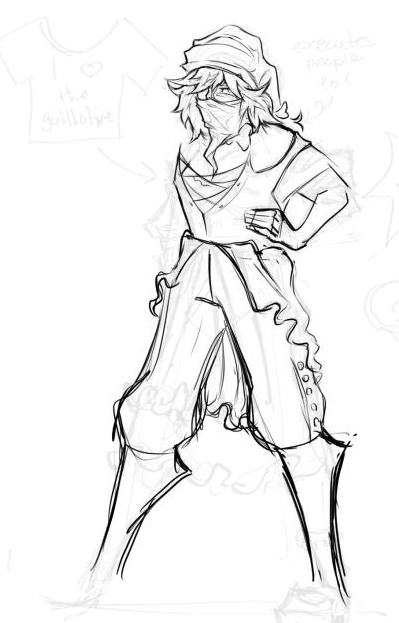
aaand because of that doodle , i researched frev fashion ! and guess what ! that robespierre fashion video came up ! wooo robespierre ! and then this was the first fucking thing i drew of him i cant . I WAS TRYING TO FIGURE OUT HOW THE FUCK HE MISSED SO BAD + HOW THE BULLET WOULD LOOK

BECAUSE after that i drew this ! pookie ! ! !
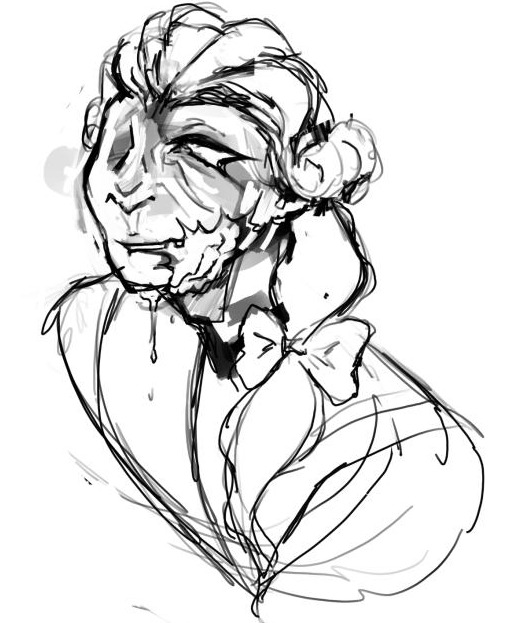
first saint just drawing . i was listening to angel with a shotgun on loop . . . and i thought . . . angel with a guillotine . . . get it cuz hes . hes angel of the terror . and . and . a

i dont have any explanation for this

i hate this . but first robespierre AND saint just drawing wahoo

first frev oc except the hair on that one drawing is red because i went back and changed it cuz i made their name Jules Le Roux and . You know . Red hair . yeah
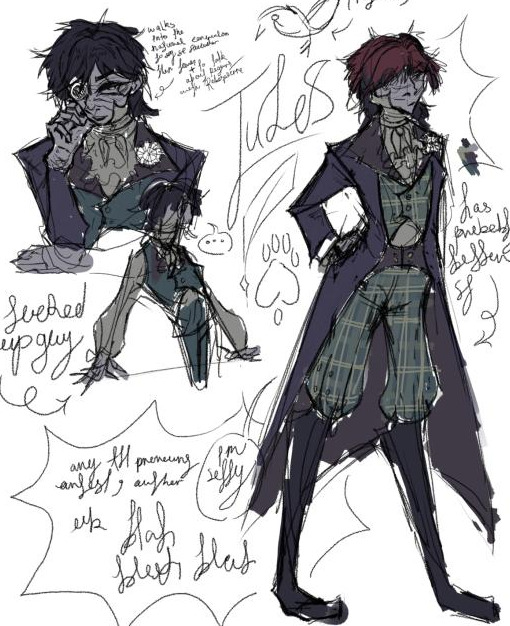
jules and calixte ! ! ! calixte is @toastytrusty ' s oc and my sweet sweet little baby i love them dearly
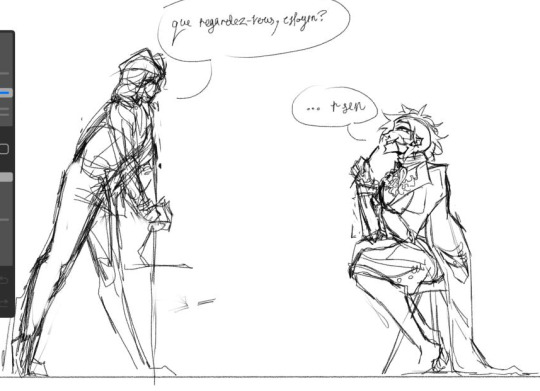
. . . saint just doodle i forgor to come back to

JULES AND CALIXTE LORE
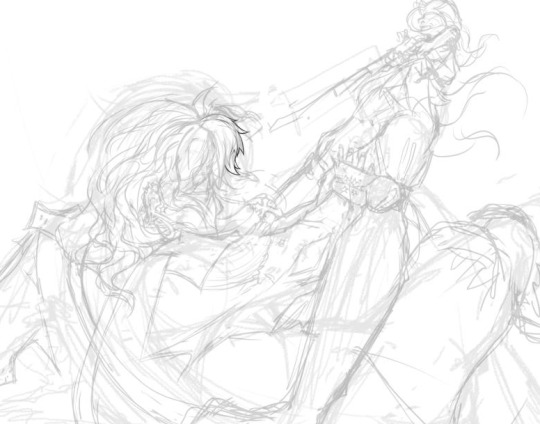
miku binder robespierre

saint just painting robespierres nails because :3

WE INTO THE AMREV NOW WOOO . anyways me when ive married and icarus and hes flown too close to the sun lol ( his wings are meant to be burning letters btw . yeah )

jules , calixte , and leonard interaction ! ! ! ! !

which didnt go well

this turned out gayer than intended i genuinely dont know what happened here

i wanted to continue this so bad but i fucking forgot about it but Uhhh uhhhhh uhhh
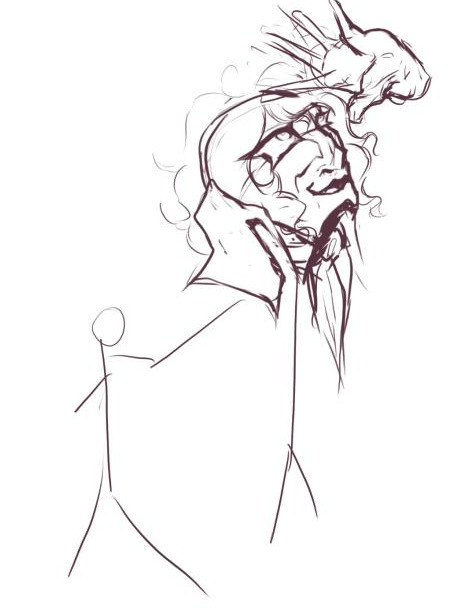
you know those vamp ! robespierre and vamp hunter ! saint just aus ? yeah

PLEASE STOP SAYING IT LOOKS LIKE A DICK IVE NEVER DRAWN A VIOLIN BEFORE PLEASE LEAVE HIM ALONE PLEASE PLEASE PLEASE . anyways he playsss theee violinnn he tucks it right underr hisss chinnnnn
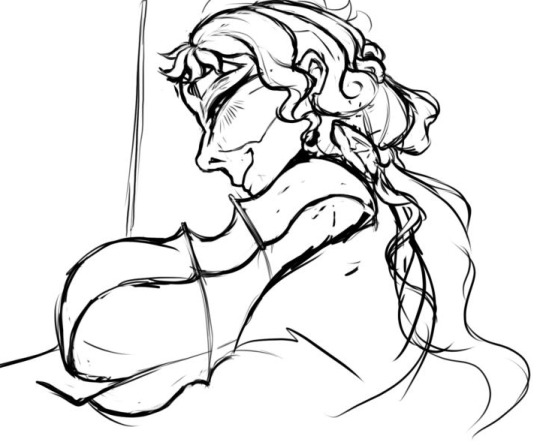
winning the idgaf war . unbothered . living his best life

theres a storytime for this drawing but ill save that for later . john adams ( 2008 ) scene redraw but instead of jefferson grabbing adams elbow its his waist except it looks awful and i need to redo it soo baddd

vamp ! robespierre and saint just ( ? ? ? i guess vamp hunter ! saint just cuz thats usually what goes with vamp ! robespierre but idk man ) . they were meant to be on like some moonlit picnic or some shit but then class ended and i forgor about this
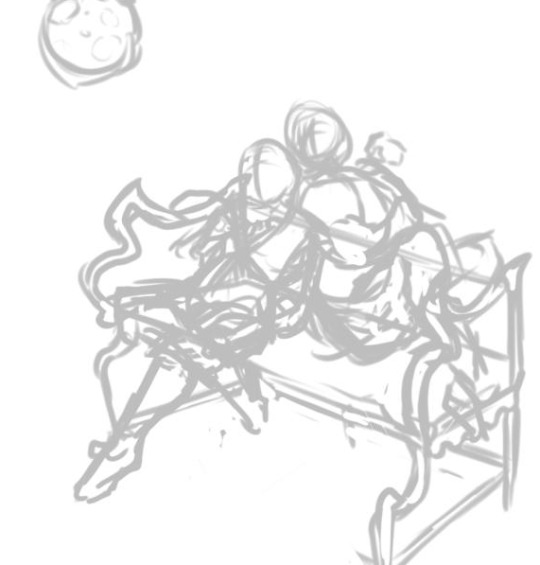
donald trump , alexander hamilton , and thomas jefferson . need i say more ?

the ORIGINAL toxic doomed yaoi ( hamburr )
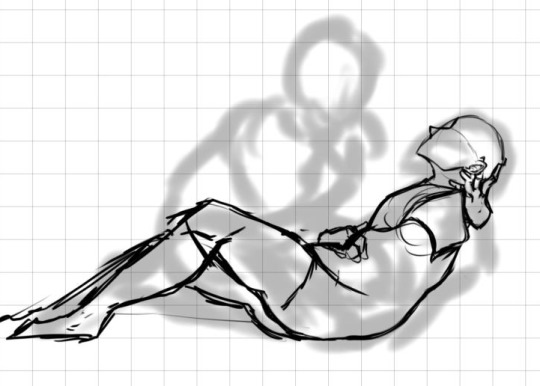
burr . boobies :3

that one scene from saint just et la forces des choses BUT AGAIN this turned out gayer than intended . why do they keep doing this
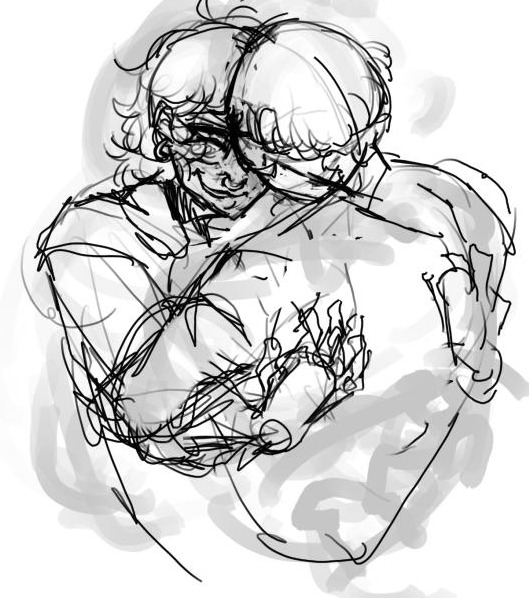
hey girl i think theres something wrong with your leg
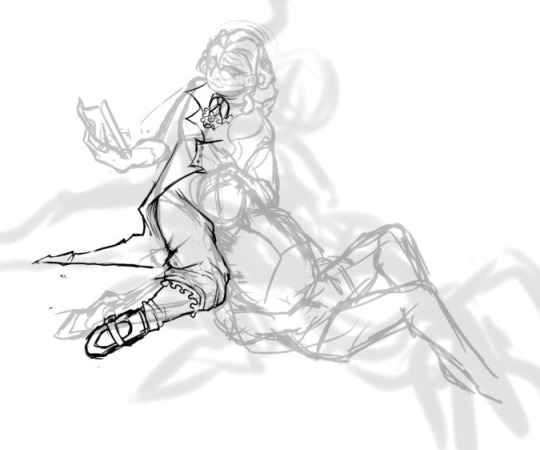
semi modern band ! gay trio . . . thing . . . ? girl idk . but i gave up

making jules a proper ref ! who cheered !

AAAND THATS IT !
let me know if . you want me to finish any of these because otherwise theyre probably going to rot in my gallery HELP
#frev#amrev#art#artists on tumblr#wip#art wip#frev art#amrev art#oc#oc art#good omens#good omens art#technically#cuz the first one was my good omens sona#robespierre#saint just#hamilton#historical hamilton#musical hamilton#jefferson#historical jefferson#1776 jefferson#1776 adams#hes there#hes not refined but hes there#john adams#like the 2008 show#trump#cant believe im tagging that#burr
22 notes
·
View notes
Text
On @keepthyfaithandthylight’s post on Farmer Refuted being Camille arguing with someone, myself and @idefilarate have been on and off rewriting songs from Hamilton to be about FRev, and thought I should post them here.
So! We haven’t been doing this in any order, and occasionally had to cut bits as they didn’t fit with the narrative, but it should still sound excellent. I’ll be posting these with the tag #Hamilton ReWrite: FRev Edition.
We start with a very Camille song - Nonstop!
Camille: After Aux Armes I went back to North Bank
Maxime: A-after all that I went back to North Bank
I finished up my studies and I practiced law
Camille: I began to write, Maxime worked next door
Maxime: Even though we started at the very same time
Camille Desmoulins began to climb
How to account for his rise to the top?
Man, the man is non-stop
Camille: Gentlemen of the jury, I'm curious, bear with me
Are you aware that we're making hist'ry?
This is the first murder trial of our brand-new nation
The liberty behind deliberation
I intend to prove beyond a shadow of a doubt
With my assistant counsel
Maxime: Co-counsel
Camille, sit down!
Our client is innocent
Call your first witness
That's all you had to say
Camille: Okay
One more thing–
Maxime: Why do you assume you're the smartest in the room?
Why do you assume you're the smartest in the room?
Why do you assume you're the smartest in the room?
Soon that attitude may be your doom!
Why do you write like you're running out of time?
Write day and night like you're running out of time?
Every day you fight, like you're running out of time
Keep on fighting, in the meantime-
Camille: Corruption's such an old song that we can sing
Along in harmony and nowhere is it stronger
Than in St Germaine
This country's economy's increasingly stalling and
Honestly that's why he's just public service seems
To be calling me
I practiced the law, I practically perfected it
I've seen injustice in the world and I've corrected it
Now for a strong central democracy
If not, then I'll be Socrates
Throwing verbal rocks at these mediocrities
Maxime: Camille, at the National Convention
Camille: I was chosen for the National Convention!
Maxime: There as a Cordeliers junior delegate
Camille: Now what I'm going to say may sound indelicate
Maxime: Goes and proposes his own form of government (What?)
His own plan for a new form of government (What?)
Talks for six hours, the convention is listless
Lafayette: Bright young man
Brissot: Yo, who the eff is this?
Maxime and Danton: Why do you always say what you believe?
Why do you always say what you believe?
Every proclamation guarantees
Free ammunition for your enemies (Awww!)
Why do you write like it's going out of style? (Hey)
Write day and night like it's going out of style? (Hey)
Every day you fight like it's going out of style
Do what you do
Maxime: Camille?
Camille: Maximilian, sir
Maxime: Well, it's the middle of the night
Camille: Can we confer, sir?
Maxime: Is this a legal matter?
Camille: Yes, and it's important to me
Maxime: What do you need?
Camille: Maxime, you're a better lawyer than me
Maxime: Okay
Camille: I know I talk too much, I'm abrasive
You're incredible in court
You're succinct, persuasive
My client needs a strong defense
You're the solution
Maxime: Who's your client?
Camille: The new Old Cordelier?
Maxime: No
Camille: Hear me out
Maxime: No way!
Camille: A series of essays, anonymously published
Defending the document to the public
Maxime: No one will read it
Camille: I disagree
Maxime: And if it fails?
Camille: Maxime, that's why we need it
Maxime: The meaning's a mess
Camille: So it needs amendments
Maxime: It's full of contradictions
Camille: So is independence
We have to start somewhere
Maxime. No, no way
Camille: You're making a mistake
Maxime: Good night
Camille: Hey
What are you waiting for?
What do you stall for? (What?)
We won the war
What was it all for?
Do you support this pamphlet?
Maxime: Of course
Camille: Then defend it
Maxime: And what if you're backing the wrong horse?
Camille: Maxime, we studied and we fought and we killed
For the notion of a nation we now get to build
For once in your life, take a stand with pride
I don't understand how you stand to the side
Maxime: I'll keep all my plans close to my chest
(Wait for it, wait for it, wait)
I'll wait here and see which way the wind will blow
I'm taking my time, watching the afterbirth of a nation
Watching the tension grow
Lucile: Look at where you are
Look at where you started
The fact that you're alive is a miracle
Just stay alive, that would be enough
And if your wife could share a fraction of your time
If I could grant you peace of mind
Would that be enough?
Maxime: Camille joins forces with George’s Danton
And Fabre D’Eglantine to write a series of essays
Defending the new Convention
Entitled Le Vieux Cordelier
The plan was to write a total of 25 essays
The work divided evenly among the three men
In the end, they wrote 85 essays
In the span of six months
Fabre got sick after writing five
Georges Danton wrote 29
Camille wrote the other 51
How do you write like you're running out of time? (Running out of time?)
Write day and night like you're running out of time? (Running out of time?)
Every day you fight, like you're running out of time
Like you're running out of time
Are you running out of time? Awwww!
How do you write like tomorrow won't arrive?
How do you write like you need it to survive?
How do you write every second you're alive?
Every second you're alive? Every second you're alive?
Danton: They're asking me to lead
I am doing the best I can
To get the people that I need
I'm asking you to be my right-hand man (Secretary or Accountant?)
I know it's a lot to ask (Secretary or Accountant?)
To leave behind the world you know
Camille: Sir, do you want me to be your Secretary or your accountant?
Danton: Secretary
Camille: Let's go!
Lucile: Camille
Camille: I have to leave
Lucile: Camille–
Camille: Look around, look around at how lucky we are to be alive right now
Lucile: Helpless
All: They are asking me to lead
Look around, isn't this enough?
He never will be satisfied (What would be enough)
He will never be satisfied (To be satisfied)
Satisfied, satisfied
History has its eyes on you (Look around)
Why do you assume you're the smartest in the room?
Why do you assume you're the smartest in the room? (Non-stop)
Why do you assume you're the smartest in the room? (Non-stop)
Why do you assume you're the smartest in the room? (History has its eyes)
Why do you fight like you're running out of time? (Non-stop)
Why do you fight like
History has its eyes on you
Camille: I am not throwin' away my shot (Just you wait)
I am not throwin' away my shot (Just you wait)
I am Camille Desmoulins
Desmoulins, just you wait
I am not throwin' away my shot
#frev#french revolution#frev community#hamilton the musical#Hamilton ReWrite: FRev edition#camille desmoulins#maximilien robespierre#georges danton#other bit parts
10 notes
·
View notes
Text
about time this account gets an intro
[will update if needed]
🙋🏻♀️basic things in blog bio; yeah i drop doodles here now and then; my twitter (@yyyylg6099) mostly reposts tho
i do shit posting as well bc, quote unquote my friend, "l got to show this to someone but l don't have irl friends who share my obsession" (tag #random otter rattles)
fyi English is not my 1st language, but that doesn't keep me from swearing a lot (sry)
⬇️fandoms
Star wars
Hetalia: axis powers
avatar the last airbender, legend of korra, the dragon prince, voltron, she-ra
percy jackson/heroes of olympus series (also trials of apollo and magnus chase)
Musicals (irl some French ones)
History fandoms (frev and bbc series Versailles)
other tv series: good omens, our flag means death, hannibal, bbc sherlock
some anime (don't want to list bc i lost count)
🤔you may ask:
ships/otps❓: yes I have those, you can find out ; btw there ARE ships I don't like much...but you like what you like so 🤷;
characters irl❓: yes i have those too;
commissions❓: you can try. no guarantee of actually finishing those but i still like getting random ideas from coms lmao;
specific fandoms/thoughts❓: askbox
🫵before scrolling away
hey I like to be friendly to ppl who are nice so if u wanna come and chat or sth, ur welcome to :D
ofc basic lines are basic lines, no using my arts (why would anyone do that mines are shitty anyway) no random insults (why would anyone do that I don't even know you)
I'd appreciate if you keep it sfw, tho idc much about nsfw
soooo anymore qs, just askbox or scroll
have a nice day my bros ☕️
4 notes
·
View notes
Note
Hey! On anon because I always feel kinda stupid for asking about Frev things that I feel like everyone assumes I should already know about, but can you tell me about Fabré, Hérault, and/or Herbois? I really don't know much about any of them and you seem pretty knowledgeable. Thanks!
Nothing to feel stupid about, we are all constantly learning sth new there! I’m glad if I can help with some revolutionaries and if you find them interesting enough to know sth more. Hope I don’t mansplain this ;)
Hérault de Séchelles was a former noble and a member of the Committee of Public Safety. One of the five people assigned to work on the Constitution of 1793, elected twice as a president of the National Convention, cousin of madame de Polignac and, apart from being a charming and light-hearted gentleman, an over all devoted revolutionary. We had mentions of Hérault participating in the storming of Bastille, but as I was recently informed it is not clear what he did there (and we don’t have any direct/more reliable sources). Just like most 1760s babies he was fascinated by Rousseau, paid 20k livres for an exclusive copy of Nouvelle Heloise, and travelled around France, being even invited to Buffon’s residence and discussing things with him. He wrote shorter, theoretical books, in which some of his thoughts were written down, both in prose, not genius in terms of expressing any idea that would turn the world upside down, but well showing his intellectual and observant nature. As a noble, he received a good education and showed much eloquence and sarcasm in a conversation, and his looks, intelligence and charm attracted many ladies and men. Well, he was also known as the hottest man of the century, after all.
Hérault was executed along with the Dantonists, but unlike them, he was suspected for being involved in spying, having connections with emgigrees and possibly leaking the files of the CPS. Despite having little ties with the rest of the Dantonists, they died on the same day. The accusations of Hérault participating in any foreign conspiracy were most likely far from the truth. Also, he had an orgy grotto.
*
Fabre was a travelling actor and dramatist, who later in his life decided to participate in politics and the Revolution, joining the Jacobin club and siding with some of the key figures, like Danton and Camille Desmoulins, with whom he also worked in the ministry of justice as a secretary. He wasn’t the embodiment of all virtues, and not necessarily representing any specific ideology with passion, speaking rather rarely at both the Convention and Jacobins, and not expressing his full talent and charisma in the short speeches which proves he wasn’t extremely devoted to politics and preferred to watch the meetings with his opera lorgnette. An opportunist willing to cause trouble and make shady deals. He was, however, expressing some of his stronger views (ex. against the Gironde) and was often assigned with important tasks.
He’s mostly known for coming up with the names for months and days in the French Republican Calendar, which was used as a revolutionary replacement of the gregorian calendar, and, unfortunately, his participation in falsifying a certain decree and illegally profiting from liquidating French East India Company, one of his many crazy intrigues. His opportunism, greed and love for intrigue led him to be accused of falsification and malversation, and guillotined on the same day as Hérault. But besides all the politics, he was a very romantic and messy mischievous man, and an excellent and sadly underappreciated poet. He didn’t have an orgy cave, but after his death a jar of pickles and three dried plums were found in his apartment so guess it’s even. We don’t know how, but just like Hérault he was a ladies man, (although a womanizer is a better word in his case). Most importantly, he has a bunch of hilarious and totally crazy youthful adventures to entertain us with.
His theatrical career doesn't belong to the most succesfull ones, but his skills and ease with the pen are certainly more admirable than the 18c public judged. After all, even his name has its roots here - d'Eglantine was added by him to the last name as a poetical particle taken from the contest he won with a sonnet in his youth. The golden eglantine was an award for prose, and not poetry, which was rewarded with a silver lily, but Fabre chose to go with the other one as it was more original and perhaps thought "du Lys", associated with the family of Jeanne d'Arc, was a little too much.
*
Collot d’Herbois shared the profession with Fabre, just like the previous man he was making a living as an actor for a few years, later to become a dramatist and a director. He was way more successful than Fabre back in the day, and his play, Lucie, has even been staged abroad. The two men met before the Revolution in Lyon, an unfortunate city in which Collot will later be assigned with a pacifying mission along with Fouché and three other men, together responsible for massacres occurring there. As an actor, Collot has been most often a leader of his troupes and showed much talent even at the beginning of his career, but he was known to have quite a fiery temper, intimidating audiences with his villain performances and taking a lot of pride in his profession. In the Committee of Public Safety, he represented a radical hébertist wing with his boyf buddy Billaud-Varenne, clashed with Robespierre a lot (almost throwing him out of a window), and, long story short, once almost ended up being assassinated, mistaken for him, which caused more quarrels in case politics wasn’t enough. Together with Billaud, Collot will take a huge part in plotting the Thermidorian Reaction, and be banished to French Guyana for the radicalism represented. The tropical holidays were not the happiest for the former CPS members, as both came down with yellow fever, which, in Collot's case, resulted in his death in 1795.
#i should also mention that hérault and fabre dated the same lady for a while#but yes the disproportion in those paragraohs is already oops#in case sth more is needed feel free to send more asks ;)#ask#fabre d'eglantine#hérault de séchelles#collot d'hérbois
19 notes
·
View notes
Note
Do you have any specific headcanons for greekgods AUs? Where the Les Amis are demigods/gods?
Hello yes I have some amazingly specific headcanons on this in fact
and very little to do with the Big 12 Olympians
Enjolras: Themis! the narrative actually gives us this one. Goddess of Divine Law/Order, good governance, fair divisions, petitions, and prophecy. Not a ruler herself, but someone any ruler should heed.
Combeferre - Eirene, a goddess of peace, and a caregiver to children-but also a goddess of spring, which was campaign season. Being for peace and the time of war at once feels like the right internal contradiction for the doctor with the armory.
Prouvaire -Orpheus. I know it's obvious. Sometimes the obvious answer is right. Art, love of love, fearlessness against death, and enough latent tragedy to make a dozen Romantic plays, all right there.
Feuilly -Atlas; obviously there's the surface "embraced the world" thing matching with the standard visual of Atlas and the globe, but I like him for Feuilly especially bc of his other association as the god of the spheres and expert in astronomy, specifically for the passage comparing the rules of honor to the stars; something many ignore, but which Atlas the astronomer knows better than anyone.
Courfeyrac- Triptolemos, a hero made immortal for his hospitality, whose role was to share the knowledge and power of agriculture , for the benefit of all people; an exceptionally helpful hero seems right for the warm heart of the group. Also: flying serpent chariot!
Bahorel- the MOST specific headcanon here: Hercules, specifically THIS Hercules:

which is Hercules, As Icon Of the French Revolution, EATING THE MONARCHS OF EUROPE, and clearly having a great time doing it.
Legle - Hermes. In this AU we allow one (1) major Olympian in this lineup and it's the god of Long Stories That Make People Forget What They Were Doing So They Can Get Where They Need to Be Long Enough For Destiny to Kick In. Someone's gotta look out for lost travelers and confused drunks and talk. Anyway, he's from Elsewhere in the pantheon to all the others XD That the herald's wand Hermes uses is so often confused for the snake-staff that Asclepius uses is just a thematic bonus.
Joly- Asclepius; a god of healing and medicine, but a very human one--to the point where there seems to be disagreement over whether he's a god at all. has a snake-staff that gets confused with the herald’s wand that Hermes uses.
Grantaire- Silenus, a god of wine, strongly associated with asses -that is, with donkeys-- to the extent of sometimes being shown with donkey's ears. A fun party god, without many of the more murder-y associations of Dionysos
thank you so much for asking!:D
#this is probably not what you were looking for but here it is#Greek gods AU#and/or#Les Amis As#Greek Myth Figures#the nature of propaganda is such#that i have genuinely no idea if that Hercules pic is Pro or Anti FRev#but either way: that's Bahorel#most of these are just about Vibes but that's just a flat out faceclaim XD#also Enjolras is Themis and that's just where it is#Hey Nonny Nonny#answereds
104 notes
·
View notes
Text
in doing like. actual research grant work i think i finally subconsciously therapized myself into realizing why i never liked saint-just all that much
im pretty sure all through high school and in some of community college i was suffering from jealousy-by-proxy, and i just wanted to be all bitter and whine that "no!! camille desmoulins is robespierre's Best Friend and no one else!!!11!!1!1"
#this is so fucking funny to me okay#it's like a mixture of feeling jealous about a friend but also like.#it's like liking a band and the fan-favorite isn't my favorite so i dislike them out of spite#like i cant think of any reason to dislike him at all but. hey it's drama#frev#sorry saint-just. youre just not my FrevPop bias.
8 notes
·
View notes
Note
HEY HEY HEY LISA
i finished that robespierre book and am now interested in frev, do you have any more information about the guy??
hey charlie
uhhhhhhh…the tyrant one? well, let’s get you away from the thermidorian propaganda, shall we?
uhhhh
my brain just stopped
@frevandrest @marat @keepthyfaithandthylight @fountain-ring @quercusfloreal @fireortheflood @idieonthishill @usergreenpixel @ anyone else
add onto this bc i can’t just say that he needs to be protected yk
43 notes
·
View notes
Note
bestie, why is there an fandom for the american revolution and do i really want to know the answer ?
HEY BESTIE
haha no you don’t want to know it’s crazy over here
lmao but actually, I don’t know why we have an amrev fandom?? there are lots of history fandoms on tumblr, i only know about amrev and frev though
I think amrev tumblr mainly started in the 2000s/2010s with the older blogs mostly of like women in their 20s in college (I don’t know why that’s just most blogs i’ve seen) and then after 2015, hamilton the musical released and depressed gay teens started studying the history side of the musical and got dragged into the hellhole that is the amrev fandom!
i watched the musical on disney plus in 2020 and got invested in the musical in 2020 october and got into amrev in jan 2021, and now i’m here lmao
but yeah it does sound kinda weird that there’s a fandom for a historical event sjfjfjgj but yes we’re crazy here and I don’t know how we’re here but we are lol
31 notes
·
View notes
Note
(History ask game) 14, 28, 29
14. Why you are interested in history ( a silly question, eh?) ?
I don't really know. I always liked different eras (but specific ones - I have major interests and major "nah, don't care about it" so I wouldn't make a good historian).
On a more pathetic note, I never really fit into my own era so maybe this is why history interests me so much. ?
28. Favourite “dream team” of specific era or the entire history?
I am dumb. Not sure what they mean by this. I will interpret it as a "group of 5 players" and my chosen era is frev.
Look. Look. Nothing I could arrange could even come near to the absolute mess they organized themselves in frev.
But let me try:
Robespierre, Marat, Saint-Just, Michel Lepeletier, Goujon
But hey, not saying that it would work.
29. Great historical mystery you are interested in?
Already answered. WTF was the Foreign Conspiracy in frev and was there a mole in the CSP. Not a great mystery but it is to me lmao.
4 notes
·
View notes
Text
MALMAISON MEDIA SALON SOIRÉE 14: AT ABOUKIR AND ACRE (1898)
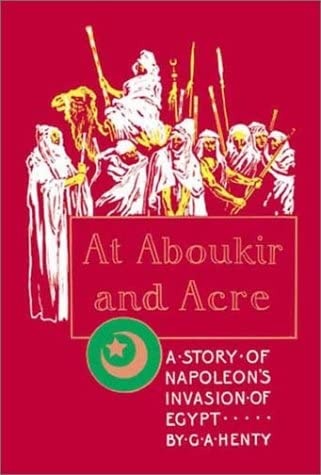
1. The Introduction
Hello, Dear Neighbors, and welcome back to Malmaison Media Salon. So, as I’ve said before, today we’re going to talk about a book by G. A. Henty, one of my archenemies!
Why archenemy?
That’s just how I label authors whose shit I reviewed before. Henty’s “wonderful” book about Frev left a bad taste in my mouth for a long time, so I was understandably mistrustful of any other piece of his.
However, after finding out he has one more Frev book AND several Napoleonic ones and this one (About the Egyptian Campaign, between the two eras), I had to make another review in spite of my lower than six feet expectations. So I went on Project Gutenberg to download the ebook for free. That’s where you can get it by the way.
But hey, maybe this book is better than the one I reviewed before. It’s always a possibility, right? The short answer is no. The long answer is not at all.
For an even longer answer, let us finally proceed with the review, which I dedicate to @koda-friedrich , @blackwidowmarshal123 and @aminoscribbles .
2. The Summary
As you might guess from the title, the book is set during the Egyptian campaign and, in classic Henty fashion, has a young English boy as the protagonist.
Edgar Blagrove, the boy in question, is a son of an English merchant who is left behind in Egypt during the war, so the book follows his adventures as he’s trying to survive, reunite with his family and have adventures along the way (as you do).
Even though Henty’s books are targeted at young boys, the premise sounds like something that I would actually enjoy, but I didn’t.
Let’s dissect this book to find out just how bad it gets, shall we?
3. The Story
The beginning isn’t so great. At first the opening scene promises some action, yet the immersion is broken like glass a couple of pages in with heaps upon heaps of Edgar’s backstory. Nice job, Henty…
Luckily, it’s the only time an extensive flashback like this is used, but the pacing can get about as fast as snail because often pieces of information get repeated in dialogues when nothing bad would’ve happened if the author avoided said repetition.
Moreover, while in the first half or so of the story the hero’s ways of getting out of problems stay realistic and justifiable, the second half has Edgar cross so far into Mary Sue territory that he may as well be called Gary Stu.
(Spoilers ahead)
This kid gets hired by SIDNEY FUCKING SMITH as a midshipman and interpreter. I’m not kidding, that’s an actual plot point!
Let me repeat: A kid who DID NOT previously serve in the navy is made midshipman and interpreter by SIDNEY SMITH, who meets said kid by pure coincidence! And only the interpreter part is justified, since Edgar was educated in several languages from a young age and learned the mother tongues of servants and citizens of Cairo too.
That, in all honesty, was the point where I just lost what little investment I had because it just became too apparent that everything will be fine and Edgar will have a happy ending.
4. The Characters
Before crossing the Gary Stu threshold, Edgar actually had potential to be a good character.
He is a reckless kid who was so bored with his monotonous life in Cairo that he wanted to see the English kick the French in the ass.
He cares about his friends, is kind and ready to help his loved ones and sometimes makes risky decisions.
But then he just becomes somebody who is always right and he gets too perfect. So all the potential goes down the drain like a dead goldfish. Hooray…
Sidi, an Arab boy Edgar rescues in the beginning of the story, is a bit more interesting, mainly due to his dynamic with Edgar as basically adopted brothers. He and his family provide Edgar with shelter in their oasis and help him out in a time of need too. Unfortunately, Sidi is a bit of a flat character for someone who gets a pretty major role in the story, but Henty isn’t too good with characters anyway.
Other characters are flat too. To various degrees. Unfortunately, that’s all I can say because there’s a ton of characters.
However, English officers like Nelson and Sidney Smith are whitewashed and glorified to no end. Henty loves sucking the dick of English nationalism, but I already saw that in my other review so no surprise there.
As for the French side of things… I was genuinely surprised that Napoleon was NOT portrayed as Devil Incarnate and it’s mentioned that he does care about his troops.
Many historical figures are name dropped but don’t appear in person, such as Kleber, Desaix, Junot, Menou, etc. Personally, I’m glad they don’t get a cameo in person for several reasons:
A) the book isn’t about them
B) it would be too unrealistic for Edgar to meet those people
C) after the atrocious portrayal of Montagnards, I DO NOT trust Henty with accuracy when it comes to French Republican generals
Eugene de Beauharnais is omitted once again, even though I’m pretty sure he participated in that campaign. Oh well, shout-out to Eugene from me!
5. The Setting
Henty is, once again, bad with settings and his descriptions are, at times, too minimalistic.
I didn’t feel the action in battle scenes, I couldn’t envision the oasis, the streets of Cairo or any other settings. There’s just not enough to achieve immersion.
6. The Writing
The writing is old fashioned, as it was a book written in the 19th century, but for people who are fluent in English there shouldn’t be a lot of issues with comprehending the vocabulary, except maybe all the naval terms that have no definitions given. Grrr…
I can’t necessarily call Henty’s writing awful, but it’s not for me so it didn’t help my overall impression of the book.
7. The Conclusion
Even though it’s not as bad as “In the Reign of Terror” was, it’s still not a book I would recommend and the improvements are insignificant.
Most characters are still flat, the annoying nationalism has still reared its head, the pacing is longer than the Amazon River and the protagonist becomes a Gary Stu in the end.
The verdict? Please find something else to read.
Anyway, the soirée is officially coming to an end. Please stay tuned because more updates are coming soon.
Love,
Citizen Green Pixel
#malmaison media salon#history#historical art#french history#napoleonic literature#napoleonic media#napoleonic art#g a henty#at aboukir and acre#book review#napoleon bonaparte#louis charles antoine desaix#jean baptiste kleber#general menou#eugène de beauharnais#sidney smith#horatio nelson#jean andoche junot
40 notes
·
View notes
Note
hey!
if you could save one revolutionary from the guillotine, who would you choose?
Oh god! This one is tricky! How could you do this to me, dude? I thought we were friends lol
BUT
I do have two strong contenders in mind...
I know that Robespierre is such a basic answer, but I guess I'm a basic Frev studier because he really is my favorite and I've definitely developed an emotional attachment for the man. I mean I know he's the most commonly known revolutionary, the only one we actually 'studied' in school, but he really just holds a special place in my heart. Being taught about how 'terrible', power-hungry, and 'ruthless' he was in Freshman year is 120% the reason I first got interested in the French revolution. I was so hyped to learn about his horrible guy who personally killed half of France on his own.
And then I found out he was actually a sweet guy with good intentions faced with impossibly hard decisions and have been head over heels (obviously not in one of those creepy romantic ways) with who he really was ever since.
Additionally, by saving him from the guillotine there are all sorts of interesting historical scenarios we could see play out. What would the world be like if Thermidor had never succeeded, had only worked out part of the way, or had never been thought of in general. He had so much life left and it really would be fascinating to see what else he could have done for France had he just been given more time.
And my other option is Camille because like... it's Camille? What's not to love about him. He is probably my second favorite revolutionary, so while idk if I would actually pick to save him over Maxime he would definitely be the immediate next option.
11 notes
·
View notes
Note
hey I know someone made a post for every chapter of the Brick and I forgot who, but do you have any posts about 1.3.1 (The Year 1817) because I would love a breakdown of all the references in that chapter? thanks!
Oh my dearest friend, I have been simultaneously eagerly awaiting and absolutely dreading this question. I tried my hand a while back at a modern version of 1.3.1-9, and in order to do that to my tastes I made a point to decode as much of The Year 1817 as possible. The version I’m including down below is mostly Hapgood since it’s much faster to copy from Project Gutenberg than to type everything word for word, but in some areas I may pull from my FMA translation for clarity.
Disclaimer: I learned about FRev once in high school and haven’t done a whole ton of earnest research for the sake of research into the period since; most of what I know pertains directly to Les Mis, and as such my knowledge of this era is a bit Swiss Cheese-y at times, so there are plenty of references I’m sure go over my head. I understand that Donougher and Rose both have copious footnotes, so if anyone has any clarity to add please do because FMA, Wilbour, Wraxall, and Hapgood have precious little: this is just me and wikipedia against the world Hugo.
I also only finished the first paragraph (as divided by Hapgood) because it’s been a couple of hours and I need a break, but I will return later with more information!
1817 is the year which Louis XVIII., with a certain royal assurance which was not wanting in pride, entitled the twenty-second of his reign.
From 1805 through 1814 Napoleon had been Emperor of France and Louis XVIII had been in exile: this is Hugo’s way of saying that Louis XVIII didn’t even acknowledge those years Napoleon had been in charge.
It is the year in which M. Bruguière de Sorsum was celebrated.
de Sorsum was a French author and translator; I think Hugo may be referring to Sakuntala (Fatal Ring), a play he translated much earlier (1803?) but which only began to gain popularity around 1815. Unrelated (probably): de Sorsum also served as secretary to Jérôme Bonaparte from 1807 through 1813 while the latter was King of Westphalia.
All the hairdressers’ shops, hoping for powder and the return of the royal bird, were besmeared with azure and decked with fleurs-de-lys.
Following the fall of Napoleon and the end of the Hundred Days War, royalists were back in charge and many people hoping to gain good favor showed signs in support of the monarchy such as powdered hair/wigs and the royal bird: to be in support of the monarchy was fashionable again. Most royal French coats of arms were also azure with fleurs-de-lys.
It was the candid time at which Count Lynch sat every Sunday as church-warden in the church-warden’s pew of Saint-Germain-des-Prés, in his costume of a peer of France, with his red ribbon and his long nose and the majesty of profile peculiar to a man who has performed a brilliant action. The brilliant action performed by M. Lynch was this: being mayor of Bordeaux, on the 12th of March, 1814, he had surrendered the city a little too promptly to M. the Duke d’Angoulême. Hence his peerage.
This one kind of explains itself, but put simply Jean-Baptiste Lynch had been a Royalist, was imprisoned during The Terror and released in the Thermidor, was made Mayor of Bordeaux, did not resist when France was being taken back from Bonaparte, and as such was rewarded for his loyalty during the Bourbon Restoration by being given a high-ranking position within the church. His wikipedia article is a bit less clear on the timeline, since it also says he fled to England during the Hundred Days War and didn’t return until the Bourbon Restoration. These aren’t mutually exclusive, of course, just an odd thing to specify when what Hugo says here isn’t mentioned at all.
Anyway, the purpose in bringing this up is for Hugo to continue harping on how traitors (to the empire) are being rewarded, how everyone in power are spineless opportunists, and to really emphasize how much society had changed in the time since 1814.
In 1817 fashion swallowed up little boys of from four to six years of age in vast caps of morocco leather with ear-tabs resembling Esquimaux mitres.
I am incapable of finding any examples of this, but I assume they look like this minus the fur? Like a leather bonnet?

(and here’s a picture of some young boys in 1800 in fun hats from a French fashion magazine as apology)
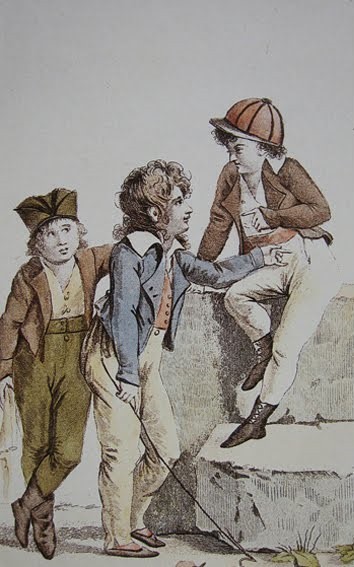
I do think this detail was probably more to set the time period in peoples’ memories, much like if I said “Remember when everyone was wearing those stretchy choker things?” but also Louis XVIII has spent his 18 years of exile in Prussia, England, and Russia, the last of which is also rather famous for a similar style of hat.
Update: Because of the occupation of France following the Treaty of Vienna, there was also a lot of cultural exchange happening, so it's much more likely that if it did become popular from foreign fashions, this (rather than Louis's exile) is what popularized it.

The French army was dressed in white, after the mode of the Austrian; the regiments were called legions; instead of numbers they bore the names of departments;
I’m not gonna dive too deep into this I say, diving very deep into trying to find any solid photo reference except that I suspect that this was probably all stuff changed in direct contradiction to what Napoleon had been doing and also as a reminder that Austria was majorly instrumental in getting Louis XVIII back on the throne and provided a lot of the occupying army members currently in France.
Update: There was also a lot of very deliberate distancing of the French military (among other things) from the way things had been done by Napoléon. The white could indicate royalist sentiment (the white flag represented the monarchy in France), that Austria had some influence in its design (due to their role as a victor and at the Treaty of Vienna), or merely be a familiar point for comparison because French citizens would have been familiar with members of the occupying Austrian army.


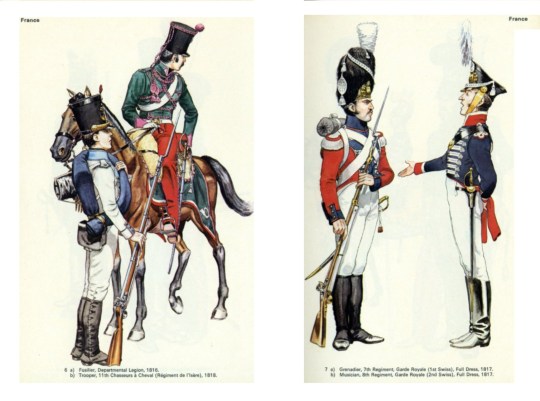
Napoleon was at St. Helena; and since England refused him green cloth, he was having his old coats turned.
St Helena is where Napoleon had been exiled to following the Hundred Days War. This (as far as what I’ve found) did not literally happen and was just Hugo’s way of saying that in exile he was forced to trade his illustrious military career (including his green military coat, which he’d actually been wearing in his exile on the Isle of Elba) for a life of quietude (including a green hunting coat/frock) until his death in 1821.
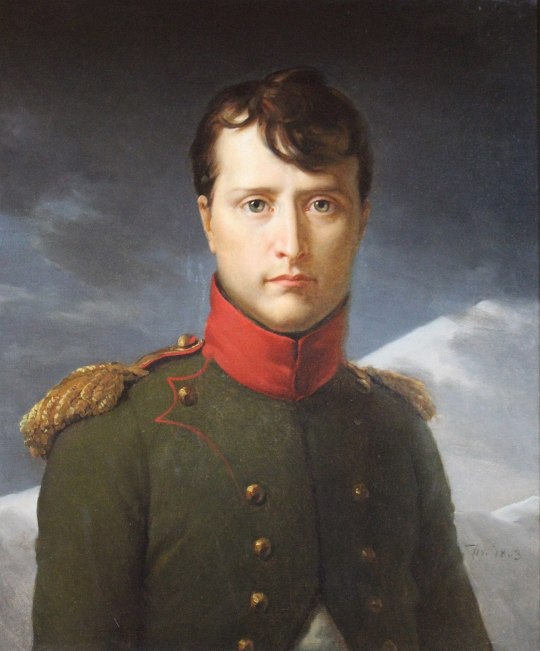

In 1817 Pelligrini sang;
Felice Pellegrini (1774-1852), an Italian opera singer.
Mademoiselle Bigottini danced
Emilie Bigottini (1784-1858) was an Italian dancer; apparently Napoleon was a fan.
Potier reigned;
Antoine Julien Potier (1796-1865) was a French artist. (I am not sure about this one, it’s very difficult to find any information on him, and what I have been finding really looks like he didn’t exhibit until 1825.)
Odry did not yet exist.
Probably a reference to Jacques Charles Odry (1779-1853)? He was a poet/playwright/comedic actor who started working as an actor in 1803 and was definitely in existence in 1817, but he didn’t start publishing his own work until 1820, which I suspect is what Hugo may be referring to here.
Madame Saqui had succeeded to Forioso.
Marguerite-Antoinette Lalanne was (1786-1866) a French tightrope walker who succeeded Pierre Forioso, another member of a troupe of “rope dancers” who was once invited to walk atop a rope from the Pont de la Concorde to the Pont des Tuileries to celebrate Bonaparte’s birthday in 1807. (Bonaparte had also been a fan of Madame Saqui: she would often walk a wire while fireworks exploded around her, depicting battles won by him.)
There were still Prussians in France.
Prussia was one of allies of Royalist France that helped force Bonaparte off the throne. (The Hundred Days War had ended in 1815, so it wouldn’t really make sense that Prussia was still here.)
Edit: I explained this poorly and have also been introduced to new and very in-depth information! Thank you @fremedon !

M. Delalot was a celebrity.
Charles Francois Louis Delalot (1772-1842) was a royalist who narrowly avoided execution during Napoleon’s reign for encouraging an uprising; under the Bourbon Restoration, he began to make a name for himself writing for a moderate Royalist publication and would soon begin climbing the ranks.
Legitimacy had just asserted itself by cutting off the hand, then the head, of Pleignier, of Carbonneau, and of Tolleron.
A tanner, writer, and engraver respectively who would ultimately be executed following the Affair des Patriotes de 1816 (imagine the Amis combined with the Guy Fawkes treason, basically). Tolleron had his right hand cut off first, and shortly thereafter all three were executed via guillotine.
The Prince de Talleyrand, grand chamberlain, and the Abbé Louis, appointed minister of finance, laughed as they looked at each other, with the laugh of the two augurs; both of them had celebrated, on the 14th of July, 1790, the mass of federation in the Champ de Mars; Talleyrand had said it as bishop, Louis had served it in the capacity of deacon. In 1817, in the side-alleys of this same Champ de Mars, two great cylinders of wood might have been seen lying in the rain, rotting amid the grass, painted blue, with traces of eagles and bees, from which the gilding was falling. These were the columns which two years before had upheld the Emperor’s platform in the Champ de Mai. They were blackened here and there with the scorches of the bivouac of Austrians encamped near Gros-Caillou. Two or three of these columns had disappeared in these bivouac fires, and had warmed the large hands of the Imperial troops. The Champ-de-Mai had this remarkable point: that it had been held in June and in the Champ-de-Mars.
Hoo boy, okay, so this one has a lot going on.
14 July 1790: Fête de la Fédération, celebration of the French Revolution which had occurred the year before in 1789. Beginning of the constitutional monarchy. Charles Maurice de Talleyrand (1754-1838) was the bishop who officiated mass at the main event in Paris, which took place on the Champs de Mars (Field of Mars).
What you really need to know here is that Talleyrand was a slippery snake: following 1790 he was close with Bonaparte, then when Bonaparte came to power in 1804 Talleyrand was named Grand Chamberlain of the Empire, and in 1806 he became Sovereign Prince of Benevento (Bénévent). By 1807 he was already scheming for bigger and better things and selling state secrets to Austria and Russia and advocated for them in Senate; he wasn’t just instrumental in the Bourbon Restoration, he was key, and in 1820 he was made a knight of the Order of the Holy Spirit by Louis XVIII.
Joseph Dominique Louis (1755-1837) was also not great: he helped Talleyrand at the Festival of the Federation in 1790, exactly as Hugo said. Under Napoleon he’d been named a Baron for his loyalty and assistance, but he later supported the Bourbon Restoration and was pretty much immediately made Minister of Finance after. Much less info about him, but I doubt his hands were clean in the upset either.
Champ de Mai (Field of May): a public assembly held by Bonaparte on the Champ de Mars on 1 June 1815, during the Hundred Days War. It was here that he was more or less sworn in again as emperor and signed the Charter of 1815 agreeing to be more liberal as a ruler if he was allowed to be emperor again. A whole throne platform was made for him, over 200k people in attendance, it was a really big to-do,
The Austrians who had camped there were part of the forces who fought against Bonaparte in the Hundred Days War. Hugo’s saying there’s still remnants of all of these allegiance swaps and all of the fighting, like, everywhere.
“The Champ-de-Mai had this remarkable point: that it had been held in June and in the Champ-de-Mars” is a pun: The Field of May happened in June on the Field of [Mars] -- also able to be translated to “March,” the month.
In this year, 1817, two things were popular: the Voltaire-Touquet
I suspect this was a minor error on Hugo’s part: Exploitation du Voltaire-Touquet wasn’t published until 1823, and I can find literally nothing else related to Touquet. He didn’t have the internet, so he gets a pass.
and the snuff-box à la Charter.
I can’t find any examples of this, but I imagine it’s kind of a novelty snuffbox (tin for your tobacco) with a print of the Charter of 1814 on it? Vicky why are you so vague?
Update: Oh, this was actually a really good one for two reasons! The Charter of 1814 was the charter created by Louis XVIII and handed down to the people, and the snuffbox was the method by which royalty (and thereby royalists) consumed tobacco! So basically, it was popular and fashionable to be seen as a royalist/supporter or the monarchy again, after nearly thirty years of this being a very unpopular take!
The most recent Parisian sensation was the crime of Dautun, who had thrown his brother’s head into the fountain of the Flower-Market.
Pretty much exactly what it says on the tin: Charles Dautun murdered his brother Augustus, cut his body into four or five pieces, and hid them all over France. He was sentenced to death in 25 July 1815 (so Hugo’s dates may have been a little off for this, or maybe there was so much going on in 1815 that no one really processed it until 1817?).
#newspapersinyourshoess#1817#in the year 1817#the year 1817#thicc bricc#les mis#answers and shitposts#napoléon bonaparte
53 notes
·
View notes
Note
Heyy, could you recommend some books and/or movies about the frev to someone that wants to start studying about this period? Thank youu :)
Hey man! No problem, and I'm sure some of us will join soon to add a bit more or correct me.
Movies are relativly a simpler topic, so let's start with that. My personal favourite will probably always be La Terreur et la Vertu - a great movie from the 60s you should totally see! Among the popular ones there is also La Revolution Française from 1989 - nice to watch as a movie, has some issues historically, but they aren't too problematic. Definitely a must-see! By all means avoid Wajda's Danton if it's going to be one of the first movies you'll see ;))
When it comes to the books Peter McPhee's biography of Robespierre is probably a first, almost elementary reading on the list, it's quite easy written, accessable and simply not bad. The books I read about the revolution itself (and not a specific historical figure) as I started learning may be harder to find and I don't know if they were ever translated to English, but there is an excellent polish frev historian who's books are pretty pleasant to read - his name is Baszkiewicz, if it's possible to find any of his books in English (especially his Robespierre bio!) I strongly recommand them. He's my main source on the historical aspect as whole, reliable and knowledgable! But among Baszkiewicz, McPhee and Hazan's A People's History of the French Revolution I can also surely recommend some books focusing on specific figures instead.
Thompson's Leaders of the French Revolution has an adventage of providing us information about some of the less known, but important figures and it's all in one place and totally worth giving it a try!
After Robespierre: the Thermidorian Reaction by Mathiez is a very good reading helping to understand, well, as the title says, what happens after the Thermidorian reaction and the fall of Robespierre. Strongly recommanded.
Mary Young's biography of Augustin Robespierre gives us an insight on the life of Robespierre's younger brother, it's surely interesting and nice reading.
Charlotte Robespierre's memoirs, a very short, light memoir written my Robespierre's sister is something definitely worth reading, you won't regret it! Elisabeth Le Bas' mamoirs aswell. If you're ever tired of politics and need something more chill and personal those are the ones!
I'm also halfway through Vinot's biography of Saint-Just and it's a good, short book you can read about this dude. Among the heavier ones there's Monar's biography of him I often use along with the first one I mentioned, and, if you can find it, Saint-Just: Colleague of Robespierre by Eugene Curtis
Zweig's biography of Joseph Fouché seems reliable and I often look up things in it, but I'm unfortunately not an expert on this guy so I might be wrong on that one.
That's all that comes to my mind by now.
Unfortunately, when it comes to cultural or social aspects not directly linked to historical events and politics I must ask our friends from the community to tell us more about it. Some of the books require us to be cautious about telling a difference between a fact and an opinion, but it's always good to see more points of viev when we're reading :))
32 notes
·
View notes